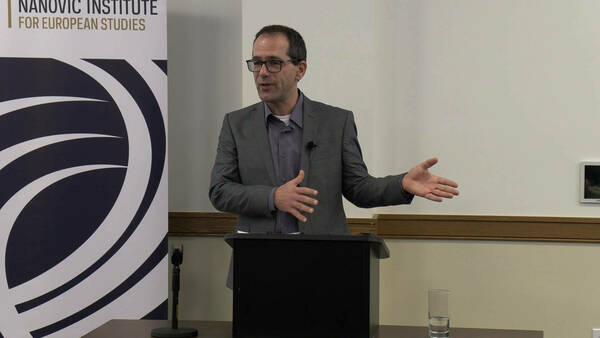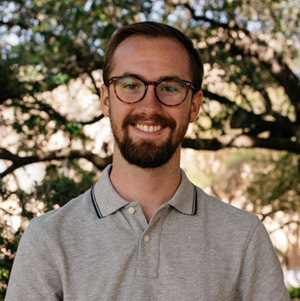
On October 6th, 2023, Professor Nitzan Shoshan delivered a lecture for the Nanovic Institute’s Decolonizing Scholarship lecture series titled “The Possibilities and Limits of Decolonizing Anthropology: Ethics, Methods, Blind Spots.” He started his talk by mentioning his habit of looking up faculty profiles to get a sense of his potential audience when visiting a university. In line with this, Professor Shoshan looked up the Nanovic Institute’s website prior to visiting Notre Dame. On the institute’s list of affiliated faculty members, he found nearly 170 profiles. Of the various disciplines represented, one was markedly absent: anthropology.
Watch the Lecture
As Shoshan put it, this discovery was not very surprising at all. Cultural anthropologists who study Europe are exceedingly rare. This is in part due to the legacy of anthropology as a discipline with its origins in colonial European projects of rendering supposedly “primitive” peoples legible to European states. Because of this legacy, the typical subjects of anthropology tend to be found in the Global South, not in Europe itself. Turning this tendency on its head, Shoshan conducted an ethnography of neo-Nazi youths in Germany with his book The Management of Hate: Nation, Affect, and the Governance of Right-Wing Extremism in Germany. In his presentation, Shoshan used this study as a springboard for a discussion of the blind spots, methods, and ethics of anthropological research.
Blind Spots: An Ethnography on the Global North from the Perspective of the Global South
A discussion of blind spots in anthropological research has to begin with a discussion of the history and trajectory of the discipline. For the past half-century, anthropology has struggled with its past and its role in colonialism. In Shoshan’s estimation, this reckoning has revealed problems related to location, gatekeeping, positionality, and justice.
As scholars began to reflect on the discipline, it became clear that anthropology had reproduced the structure of a colonial geography within its own production of knowledge. In essence, access to research institutions, funding for fieldwork, and connections to networks of prestigious scholars mirrored the boundaries of the old colonial powers. Because of this, anthropology tends to focus on subjects who live in the Global South.
Practices of gatekeeping have helped reinforce these boundaries not only in terms of who has access to resources but also in terms of what topics are deemed acceptable. Linguistic hierarchies, discriminatory admissions criteria, the peer review process, and high costs of attending university or of conducting and publishing research mean that anthropological research has typically been conducted from the perspective of Europe, or at least the Global North. In part because of this, the study of far-right extremism is usually not seen as having a place in anthropology.
At the same time, anthropologists must account for their own positionality in the research they conduct. This has implications for the kinds of phenomena that anthropologists study. For instance, Shoshan’s Hebrew name was a constant danger to his research on young neo-Nazis in East Berlin. Similarly, many anthropologists maintain that scholars have an obligation to cooperate with or even advocate on behalf of those whom they study. This, however, becomes problematic for anthropologists studying neo-Nazism and has led to a general eschewal of research on the far-right within the field.
Methods: Paths Forward with Covert Ethnographies
To Shoshan’s mind, a few possible solutions to these blind spots present themselves. Among others, covert ethnographies can overcome problems of access and physical risk. At the same time, scholars may have to be willing to be flexible in whether they present their subjects in a positive light and whether they advocate for them.
While conducting ethnographic studies, anthropologists sometimes face problems of access or even physical danger. It can be difficult to win the trust of closely knit social groups, especially when they are skeptical of outsiders. Indeed, when it comes to extremist groups, anthropologists may even confront physical risks to their own persons.
In his study of far-right youths in Germany, Shoshan overcame these obstacles by working with social workers to gain access to groups and by using a pseudonym to hide his Hebrew name. The social workers that Shoshan worked with had long-standing relationships with members of far-right groups and had gained their trust over time. With their help, Shoshan was able to win the trust of some members of ultra-right groups and thereby gain an entry point into them. However, because of the nature of these groups, he could not reveal his true identity to them. In a major break with the tradition in anthropology, he disguised himself as an American graduate student with an interest in the far-right to protect his real identity.
Ethics: Questions of Consent and Deceit in the Writing of Covert Ethnographies
"The distinction between honesty and dishonesty, truth and lies, secrecy and disclosure in ethnographic fieldwork sometimes reveals itself under critical scrutiny as far more porous and unstable than decolonizing discussions of ethics and methodology often allow. Indeed, it is porous as social life itself."
At this point in the lecture, Shoshan turned to the ethical quandaries that his approach to overcoming problems of access and safety poses. How, after all, can the subjects of a study give informed consent when the study is being conducted covertly? And is there not also some level of deception involved in using a pseudonym?
Shoshan addressed these concerns by pointing to the particularities of his own positionality and to the necessarily performative character of social research in general. In particular, the use of a pseudonym was necessitated by Shoshan’s Jewish background, which would have been unwelcome to the neo-Nazi youths whose trust he hoped to gain. Other scholars, Shoshan pointed out, might very well have found other ways to overcome the problems of access and risk that confronted him.
At the same time, Shoshan suggested that the problem of informed consent in conducting a covert ethnography is less unique to this method than it may first appear. As he sees it, ethnographic research in general requires some level of performativity. There is always some element of role-playing when one performs as “researcher” rather than friend, brother, wife, or restauranteur, as the case may be. Thus, there is always a Janus-faced element of complicity in ethnographic research, since one performs a role, that is always partially deceptive, in order to observe the roles played by the subjects of one’s study, roles which are also always partly deceptive, whether consciously or unconsciously so.
Shoshan concluded his lecture by reflecting on the ways in which these problems are inherent in all social interactions. Rather than particularities of anthropology, they may reflect broader problems of social action. To overcome them, Shoshan suggested, scholars should not cling to categorical imperatives of social research, but allow for flexibility in approaching diverse situations and trade the benefits of certain kinds of knowledge against the costs of procuring it.

About the author
Joseph Clarkson is a Ph.D. candidate in Political Science at the University of Notre Dame specializing in Political Theory and International Relations. Joseph’s dissertation examines the sources of political unity in the state theories of Carl Schmitt and Hermann Heller, two of the most important political thinkers of the Weimar Republic. His interests include theories of state formation and sovereignty as well as the causes of war in the history of political thought. His research has been published by Political Research Quarterly.